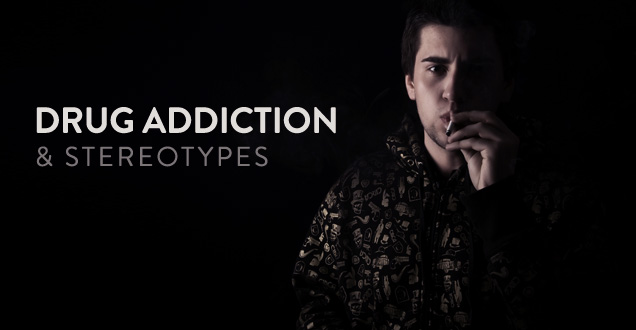
Drug addiction is portrayed with some frequency in today’s media, and many people think they have some idea of what “addicts” look like and how they act. This assumption, based on what we see in movies, on television and even in the stories chosen to run on the evening news, can have tragic consequences because many people suffering from addiction and drug abuse don’t fit those images and, as a result, can have a harder time getting help. Becoming aware of common stereotypes and of the ways in which they don’t match the truth is important for learning how to spot real signs of addiction and for removing the stigma of getting treatment.
Common Stereotypes
Some of the common drug addict stereotypes are easy to reel off. Recreational drug users may start out as teens or young adults, students who are influenced by their peers. They are likely to grow up with abuse or in troubled homes. In the U.S. there is a stereotype of disadvantaged people living in inner cities, in poverty, being more prone to drug abuse, especially minorities in those areas. Many people assume that drug abuse always comes with tell-tale physical signs, such as weight loss, scabs or scars from injections, unhealthy skin color, dark circles under the eyes and so on.
Addicts are commonly assumed to be uneducated, often dropping out of school early and either ignorant or uncaring of the consequences of their choices. They are assumed to quite possibly be homeless and likely to engage in criminal behavior beyond the use of illegal drugs. The stereotypes say they are disinterested in change and would prefer to let the rest of society pick up the tab for their choices (and pick up the pieces when their lives fall apart).
Addiction Realities
Stereotypes often have a kernel of truth inside them, which is what makes them stick. It’s true that some addicts reflect some or even many of these stereotypical images. But the fact is that the ways addiction is portrayed in popular culture, especially in the media, tends to teach us to assume that all addicts fit these stereotypes when most do not.
While some addicts are minorities or are financially disadvantaged, many others are successful professionals. These individuals often maintain their responsibilities well and may pursue very healthy choices elsewhere in their lifestyles. Having financial resources can change the face of addiction significantly, in both physical and social ways. For example, someone with enough money to support their habit is far less likely to pursue other forms of crime than someone who is lacking the cash to buy drugs. Also, sometimes the characteristic physical symptoms associated with addiction are actually due more to malnourishment or other kinds of physical ailments, not because they’re the direct result of drug use. Individuals who have financial resources and apparently successful lives are better able to avoid such complications. They have the resources to feed their addiction – and to hide it.
Real Signs to Watch For
Learning real signs of addiction could help you save someone’s life. Instead of unreliable stereotypes, here are some typical warning signs to look for.
Behavior changes are some of the best warning signs of potential trouble. For instance, people may start to withdraw and isolate themselves in order to use drugs privately and to avoid unwanted attention when they are drunk or high. They might start to let responsibilities slip or stop taking interest in hobbies and activities they previously enjoyed. Some people develop mood swings in response to changes in drug use or because of increased cravings for drugs. Marked changes in daily habits can also be trouble signs, as a person rearranges their time around new or increased drug use.
Addiction is not the only possible reason for any of these signs, but whether or not addiction is the problem, someone who shows any of these behavioral changes may need help. The best thing to do is to talk honestly with them about your concerns and encourage them to seek the help they need.
Related Content:



